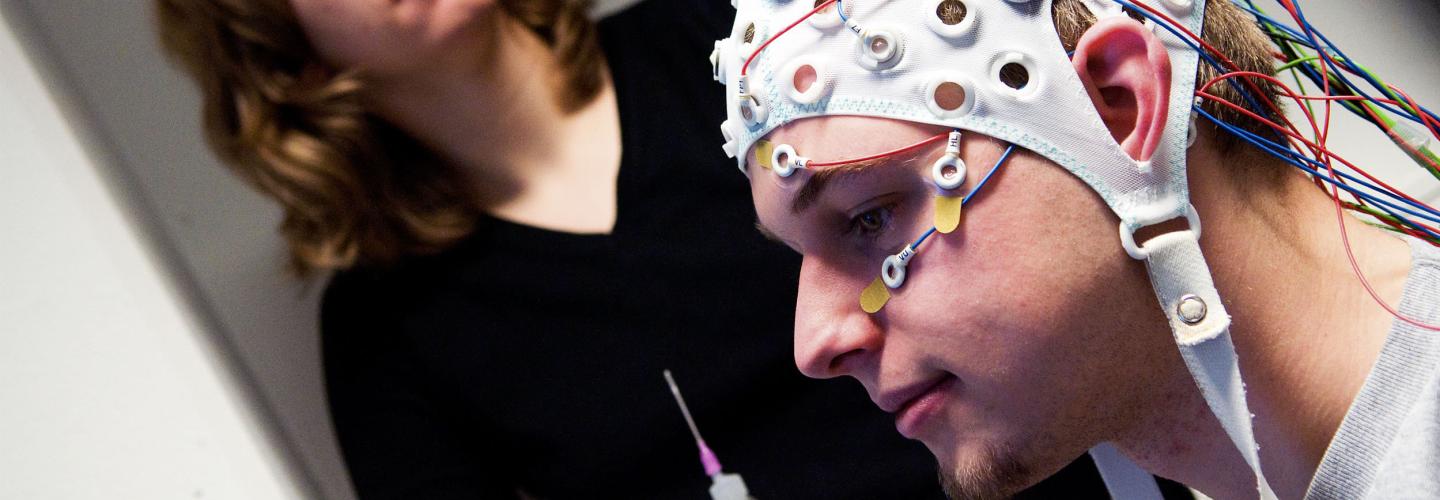Why this programme
The brain is a challenging topic to explore if you want to understand behaviour. Yet, the complexity of its myriad of neurons, dozens of biochemical messengers and infinite neuronal interconnections attract many researchers to this highly challenging field.
The Neuropsychology specialisation offers an integrated curriculum that includes most aspects of basic and applied neuroscience. Under the guidance of a multidisciplinary team of mainly psychologists , psychiatrists and psychopharmacologists as well as biologists, you will learn to use state-of-the art clinical and neuroimaging techniques (like EEG and fMRI) and behavioural laboratory facilities.
Internships
From November of the second year, you will devote your time to the preparation and execution of your research internship and master’s thesis. You will conduct your own research project (very often as part of a larger ongoing study), including the writing of a proposal, acquiring and analysing the data. The work is reported in a master’s thesis, written in the style of a scientific journal article. Given the strong multidisciplinary research infrastructure here in Maastricht as well as extensive international networks, you will have ample opportunities for internships related to any aspect of Neuropsychology, either locally or at other top universities throughout the world. We will help you find a topic and location that best fit your own interests and career goals. You can find a list of internship locations at the bottom of the page.
If you specialise in Neuropsychology, you may also choose to conduct an optional clinical internship in an approved setting, for at least 13 weeks. This can be done in conjunction with the required research internship or separately. Based on client/patient-based investigations you perform during the clinical internship, you will submit an additional, brief research report: the minor thesis. The length of the research internship and associated credits will be adjusted accordingly, so that you can complete both internships within the 2-year timeframe of the curriculum.
Teaching staff and research environment
Research covers a broad range of topics, with a primary focus on understanding cognitive (e.g. memory, perception, attention) and emotional-affective (e.g. mood, motivation, arousal) aspects of human behaviour. Starting from the perspective of brain structure and function, neuropsychology investigates the continuum from normal behaviour to psychological dysfunctions (e.g. depression, addiction and eating disturbances, schizophrenia, ADHD) across the lifespan. In addition, brain-behaviour relationships are studied by pharmacological or dietary manipulation of brain neurochemistry and function, mainly in humans. At Maastricht University, scientists affiliated with the European Graduate School of Neuroscience (EURON) conduct experiments that include the use of psychoactive substances in combination with behavioural, psychophysiological and functional neuroimaging techniques.
Australia
- Newcastle University, Australia

Canada
- Dalhousie University Halifax, Canada

Germany
- University Aachen, Germany

Kenya
- University of Nairobi, Kenia

The Netherlands
- Maastricht University, Netherlands; Leiden University; Trier University
- FC Donders Center, Nijmegen, NL
- Leiden University, Netherlands

New Zealand
- Melbourne University, New Zeeland

Sweden
- Karolinska Institute, Stockholm & Maastricht University

United Kingdom
- Oxford University, UK
- BCNI University Cambridge, UK
- University Glasgow, UK

United States of America
- University of California, San Diego, USA
- Berkeley University California, USA

